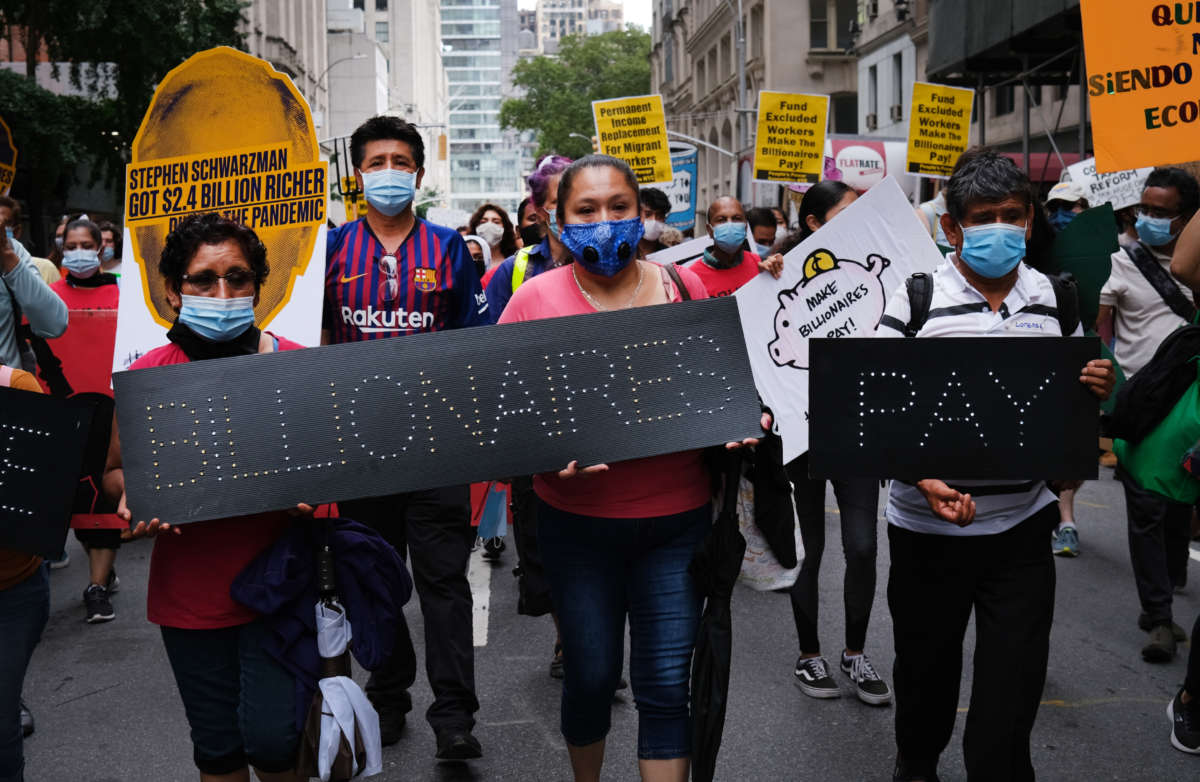The world’s 10 richest billionaires added roughly $402 billion to their collective wealth in 2021, a year marked by continued suffering and economic dislocation fueled by the global coronavirus pandemic.
“Heading into 2022, the 10 wealthiest individuals in the world are all worth more than $100 billion,” CNBC noted, citing the Bloomberg Billionaires Index, which tracks and ranks the fortunes of the planet’s richest people.
Rep. Pramila Jayapal (D-Wash.), the chair of the Congressional Progressive Caucus, said Sunday that the staggering growth of billionaire wealth amid a worldwide public health emergency and economic crisis should compel Congress to finally redress the fundamental injustices of the U.S. tax system.
“In 2022,” said Jayapal, “let’s tax the rich and invest in our communities.”
At the top of the Billionaires Index at the close of 2021 was Tesla and SpaceX CEO Elon Musk, who added over $121 billion to his wealth last year as the pandemic both took and completely upended lives, pushing tens of millions of people into poverty and intensifying preexisting inequities. Just behind Musk on the list was former Amazon CEO Jeff Bezos, who tacked $5 billion onto his net worth in 2021, leaving him with a total fortune of $195 billion.
In November, the head of the World Food Programme (WFP) outlined a proposal by which Musk — now the richest man in the world — and other U.S. billionaires could donate just 0.36% of their pandemic wealth gains to help 42 million people facing starvation.
“The $6.6 billion required would help those in most need in the following way: one meal a day, the basic needed to survive — costing $0.43 per person per day, averaged out across the 43 countries,” the WFP said. “This would feed 42 million people for one year, and avert the risk of famine.”
The billionaires have not taken the WFP up on its modest plan to save millions of lives with a miniscule fraction of their pandemic profits.
The investigative outlet ProPublica reported in June that Musk, along with other U.S. billionaires, “paid $0 in federal income taxes” in 2018. Late last year, Musk garnered widespread publicity for selling off a portion of his Tesla stock, triggering a significant taxable event.
But as Bob Lord, an associate fellow at the Institute for Policy Studies, observed in a recent blog post, Musk “has paid tax in 2021 — lots of it — because doing so was by far his best option.”
“Did he pay more tax than any American in history, as he claims? Probably,” Lord wrote. “But he also received compensation of more than $20 billion, which almost certainly dwarfs the compensation any other CEO in American history has ever been paid, from a company with profits not remotely commensurate with that level of compensation.”
2021 is coming to a close with the 10 richest people in the world all worth more than $100 billion https://t.co/EP8FwDGy1Q
— Nick Vega (@atNickVega) December 30, 2021
The updated billionaire wealth figures come as Democrats in Congress are struggling to chart a path forward for their flagship social spending and climate legislation, which has been held up by corporate-backed Sen. Joe Manchin (D-Wa.).
The House-passed version of the Build Back Better Act includes a surtax on millionaires and other measures to help fund the bill’s investments and reduce out-of-control inequality. According to the Washington Post, Manchin recently told the Biden White House that he would be willing to support “some version” of a tax targeting billionaires, an idea that the West Virginia Democrat criticized in October.
“While the specifics of what Manchin would support remain unclear, Senate Finance Committee Chairman Ron Wyden (D-Ore.) has unveiled a tax aimed at the accrued wealth of America’s approximately 700 billionaires,” the Post noted. “The measure is aimed at addressing the massive gains of the wealthiest Americans with a federal tax and probably would be unprecedented in how few people it affected… Congress’ nonpartisan scorekeeper has estimated it could raise as much as $550 billion over 10 years, or pay for more than one-quarter of the Democrats’ spending bill.”
In a social media post on New Year’s Day, the Patriotic Millionaires — a group composed of wealthy supporters of progressive taxation — warned that “history paints a bleak picture of what happens to extremely unequal societies.”
“For the well-being of rich and poor alike, it’s time to confront inequality and choose to tax the rich,” the group wrote. “If you don’t, then all the talk at Davos won’t change what’s coming — it’s taxes or pitchforks.”
Angry, shocked, overwhelmed? Take action: Support independent media.
We’ve borne witness to a chaotic first few months in Trump’s presidency.
Over the last months, each executive order has delivered shock and bewilderment — a core part of a strategy to make the right-wing turn feel inevitable and overwhelming. But, as organizer Sandra Avalos implored us to remember in Truthout last November, “Together, we are more powerful than Trump.”
Indeed, the Trump administration is pushing through executive orders, but — as we’ve reported at Truthout — many are in legal limbo and face court challenges from unions and civil rights groups. Efforts to quash anti-racist teaching and DEI programs are stalled by education faculty, staff, and students refusing to comply. And communities across the country are coming together to raise the alarm on ICE raids, inform neighbors of their civil rights, and protect each other in moving shows of solidarity.
It will be a long fight ahead. And as nonprofit movement media, Truthout plans to be there documenting and uplifting resistance.
As we undertake this life-sustaining work, we appeal for your support. We have 7 days left in our fundraiser: Please, if you find value in what we do, join our community of sustainers by making a monthly or one-time gift.
